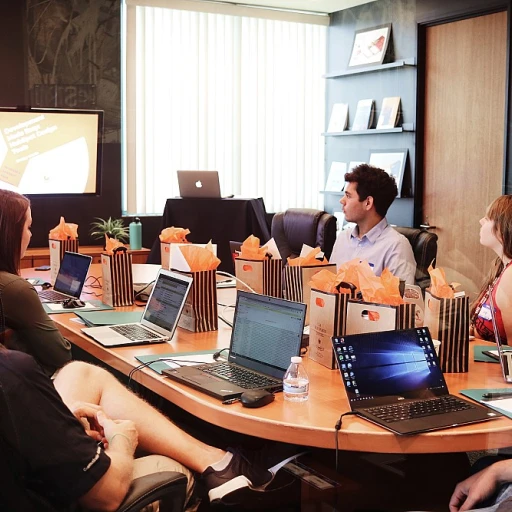
Understanding Staff Engagement Roles
Diving into the World of Employee Engagement Roles
In today's dynamic workplace, staff engagement roles have become increasingly pivotal. For those unfamiliar, these positions focus on fostering a work environment where employees feel valued, motivated, and aligned with the company's goals. With businesses worldwide realizing the benefits of engaged employees, the demand for professionals skilled in this area is on the rise. An employee engagement specialist wears many hats. They might be involved in creating engagement strategies, organizing engagement activities, or improving employee communication within the team. It's a role where one day you might be developing an engagement strategy, and the next, you're diving deep into a team member's experience enhancing their professional development. Employee engagement roles often intersect with human resources, as they share the common goal of nurturing a positive company culture. This means engaging with internal communications, access to employee feedback, and fostering a collaborative environment where all team members feel heard. For those keen on a career in employee engagement, understanding staff engagement roles and their multifaceted nature is crucial. These roles offer a variety of responsibilities and require a skill set that includes strong communication, strategic thinking, and a passion for improving the employee experience. To further explore the intricacies and develop the requisite skills, visit this guide on enhancing employee engagement through skills inventory. This resource provides valuable insights into how you can prepare for a successful journey in this field, opening doors to numerous professional opportunities in the days ahead.Key Skills for Success in Staff Engagement Jobs
Essential Abilities for Excelling in Staff Engagement Careers
In the realm of employee engagement, possessing the right skill set is crucial for thriving and making a meaningful impact. When we think about improving employee engagement, a blend of both soft and hard skills forms the foundation of any successful engagement professional.- Strong Communication Skills: The ability to effectively communicate with employees is key. This includes clarity in conveying messages and actively listening to team members, within the framework of internal communications.
- Empathy and Emotional Intelligence: Understanding employees' perspectives and being able to relate to their experiences on a human level can significantly improve team rapport and overall workplace culture.
- Strategic Thinking: Developing engagement strategies that align with the company's goals while addressing employees' needs is essential. This involves planning and executing activities that boost employee morale and align with the business objectives.
- Problem-Solving Abilities: Handling challenges in engagement roles requires quick and innovative solutions, especially when team dynamics shift.
- Project Management Skills: Engaged employees need clear objectives, which requires overseeing engagement activities and strategies effectively. The ability to organize, prioritize, and manage multiple tasks or projects is crucial.
- Adaptability: As company culture evolves, so too should the approach to employee engagement. Being open to change and willing to learn from each experience is invaluable.
The Impact of Staff Engagement on Company Culture
Infusing Dynamic Change with Staff Engagement
The impact of staff engagement on company culture cannot be overstated. Over the years, a strategic focus on employee engagement has shown to profoundly transform the overall environment in which employees work. With engaged employees, there is a noticeable uptick in positive energy and motivation, critical for fostering a supportive and productive team. Understanding how staff engagement shapes business culture involves recognizing several key benefits:- Enhanced Communication: Strong internal communications are vital in staff engagement roles, offering employees a clear channel to express ideas and feedback, thus promoting openness and mutual respect within the team.
- Increased Productivity: Companies employing tailored engagement strategies often see their team members commit more fully to their tasks, leading to an uptick in productivity and efficiency.
- Improved Employee Experience: With more emphasis on professional development and access to career progression opportunities, employees feel more valued, directly supporting an engaged workforce.
Challenges Faced in Staff Engagement Positions
Overcoming Obstacles in Staff Engagement Roles
Working in staff engagement is a rewarding yet challenging career path. Professionals in this field are tasked with fostering a positive work environment where employees feel valued and motivated. However, several hurdles can make this job demanding.
One significant challenge is maintaining effective communication across diverse teams. With employees working in different departments or even remotely, ensuring everyone is on the same page requires robust internal communications strategies. This is crucial for developing a cohesive company culture where all team members feel included and engaged.
Another obstacle is the constant need for innovation in engagement activities. What worked a few days ago might not resonate with today's workforce. Engagement professionals must continuously seek new strategies to keep employees interested and motivated. This often involves staying updated with the latest trends and adapting to the evolving needs of the workforce.
Additionally, balancing the interests of the company and the employees can be tricky. While the business aims for productivity and efficiency, employees seek professional development and a fulfilling work experience. Finding a middle ground that benefits both parties is a delicate task that requires skillful negotiation and strategic planning.
Lastly, measuring the impact of engagement initiatives can be challenging. Quantifying employee engagement and its effects on company performance is not always straightforward. Engagement professionals must develop metrics that accurately reflect the success of their strategies, which can be a complex process.
Despite these challenges, those in staff engagement roles play a crucial part in shaping a positive work environment. By addressing these obstacles head-on, they contribute significantly to the overall success and culture of the company.
Career Pathways in Staff Engagement
Progressing in Employee Engagement Careers
Exploring career pathways in employee engagement can lead to a fulfilling professional journey. Recognizing the significance of employee engagement roles, one notices the rising demand for expertise in this dynamic field. Securing a position in this realm not only advances your career but also contributes significantly to the business’s success in fostering a vibrant company culture. The progression typically involves starting as an entry-level coordinator or specialist, focusing on organizing engagement activities and managing internal communications. As experience builds over time, professionals move into roles such as employee engagement managers or directors, where they oversee engagement strategies, implement development activities, and focus on improving employee experience across departments. Engaged employees often translate to more productive workers, making these positions crucial in today’s competitive business environment. Professionals in this field benefit from comprehensive knowledge in human resources and a deep understanding of company policies, including privacy policies related to accessing employee information. Individuals eyeing these career pathways should invest in professional development opportunities, such as workshops and certifications, to hone key skills required for success. These may include strong communication abilities, strategic thinking, and the ability to cultivate an inclusive culture where team members feel valued and engaged in their work efforts. Moreover, the continued emphasis on employee engagement underscores the availability of diverse opportunities. From full-time positions to consultancy roles, the landscape is vast for those willing to navigate the challenges presented in this rewarding field. With every milestone, professionals contribute to a company's culture, fostering an environment where employees not only work but thrive.Future Trends in Staff Engagement
Anticipating Future Shifts in Employee Engagement
Employee engagement, a field brimming with potential, is expected to evolve significantly in the coming years. As businesses adapt to change, professionals in this area must stay attuned to emerging trends that will shape their work and strategies. Here are some key insights:- Technology Integration: The integration of advanced technologies will continue to transform how engagement activities are designed and implemented. Tools that promote seamless internal communications will become indispensable, enhancing the employee experience and making remote work more collaborative.
- Focus on Well-Being: Companies are increasingly recognizing the link between employee wellness and engagement. Future strategies will likely emphasize mental health support, work-life balance, and comprehensive wellness programs for team members.
- Agility in Engagement Strategies: With the rapid pace of change, having a flexible engagement strategy will be crucial. Businesses that can quickly adapt their engagement methods in line with evolving company cultures will benefit from more engaged employees.
- Emphasis on Professional Development: Ongoing professional development opportunities will help in cultivating engaged employees. Providing team members with access to career advancement resources can significantly enhance their satisfaction and productivity.
- Data-driven Approaches: Leveraging data analytics to understand the preferences and needs of employees will help in crafting personalized engagement strategies. This data-driven approach will enable the development of targeted initiatives that resonate with the workforce.













